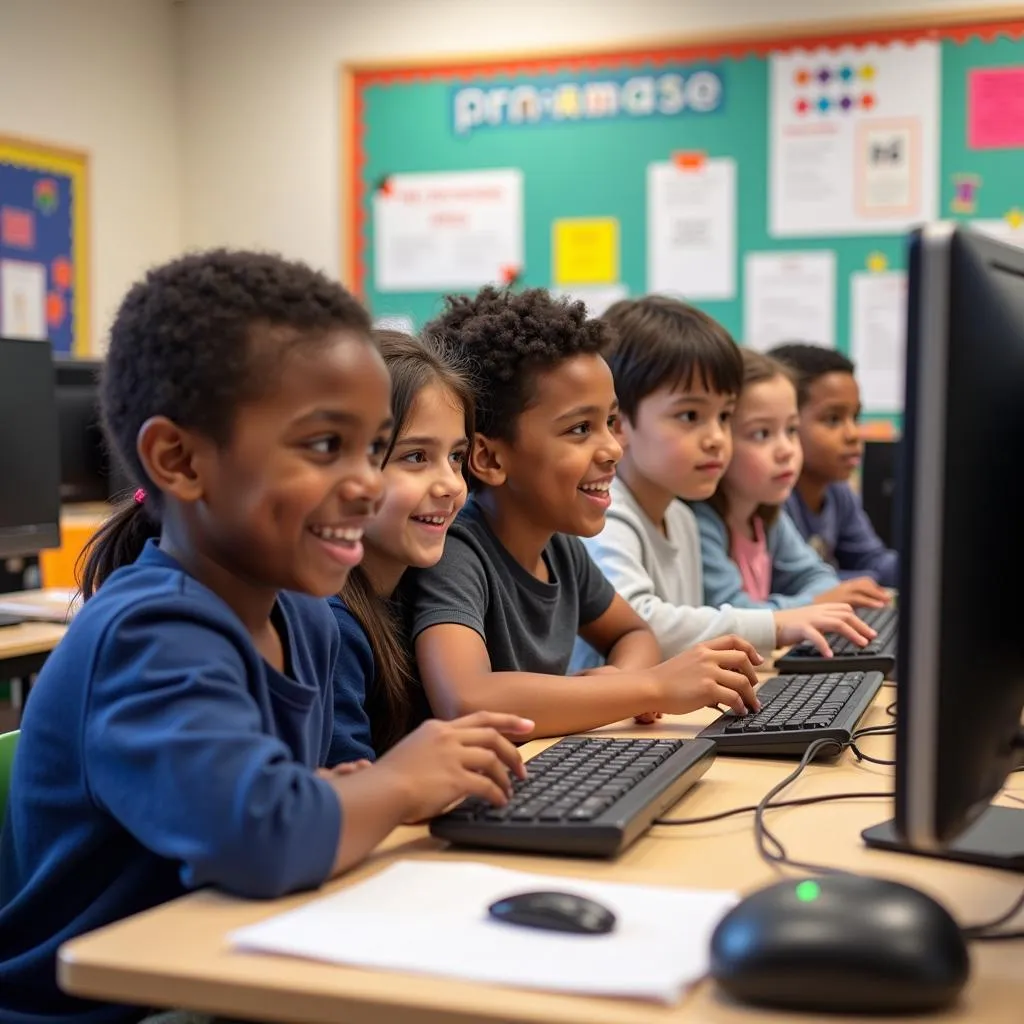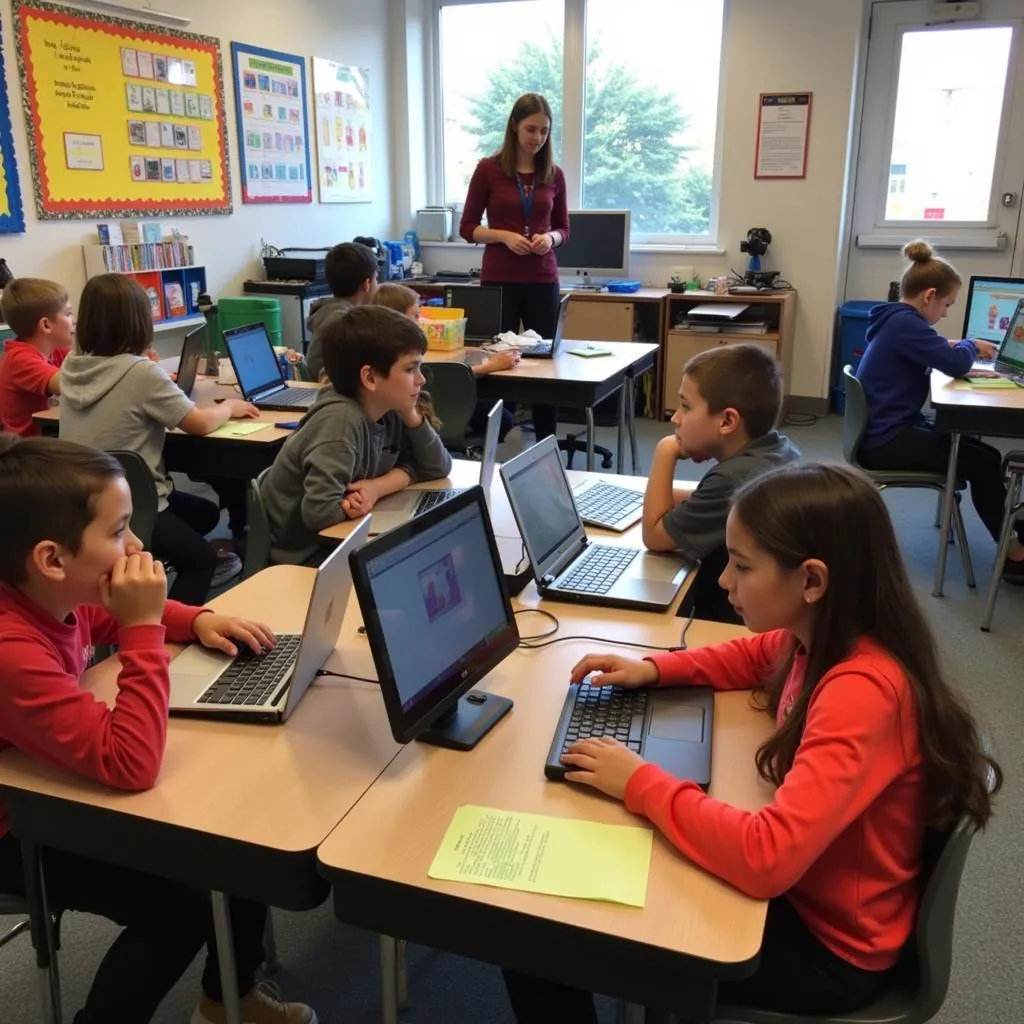In recent years, the topic of teaching coding in primary schools has gained significant attention in IELTS Writing Task 2 exams. This subject reflects the growing importance of digital literacy in our rapidly evolving technological landscape. Based on past exam trends and the increasing relevance of this topic, it’s highly likely that questions related to coding education for young learners will continue to appear in future IELTS tests. Let’s explore a sample question that has been frequently encountered in recent exams:
Some people think that children in primary schools should be taught how to code. Others believe there are more important things to learn at this age. Discuss both views and give your opinion.
Analysis of the Question
This question presents a balanced argument about the introduction of coding in primary school curricula. It requires candidates to:
- Discuss the viewpoint supporting coding education for young children
- Explore opposing arguments that prioritize other subjects at this age
- Provide a personal opinion on the matter
Candidates should aim to present a well-structured essay that addresses all parts of the question while maintaining a clear and coherent argument throughout.
Sample Essay 1 (Band 8-9)
In today’s digital age, the debate over introducing coding to primary school curricula has intensified. While some advocate for early exposure to programming skills, others argue that traditional subjects should take precedence. This essay will examine both perspectives before presenting my own viewpoint.
Proponents of teaching coding to young children argue that it prepares them for the future job market. In an increasingly technology-driven world, programming skills are becoming essential across various industries. By introducing coding at an early age, children can develop logical thinking and problem-solving abilities that are valuable in many aspects of life. Moreover, early exposure to coding can spark interest in STEM fields, potentially leading to more diverse and innovative workforces in the future.

On the other hand, critics contend that primary education should focus on fundamental skills such as reading, writing, and arithmetic. They argue that children need a strong foundation in these core subjects before delving into specialized areas like coding. Additionally, some worry that emphasizing coding might come at the expense of other crucial developmental areas, such as social skills, creativity, and physical education. These opponents believe that a well-rounded education should take priority during a child’s formative years.
In my opinion, while traditional subjects remain crucial, incorporating basic coding concepts into primary education can be highly beneficial. The key lies in striking a balance between foundational skills and technological literacy. By integrating coding into existing subjects, such as mathematics or science, schools can introduce programming concepts without compromising other essential areas of learning. This approach can foster critical thinking and problem-solving skills while still maintaining a focus on core academic subjects.
In conclusion, the inclusion of coding in primary school curricula offers significant advantages when implemented thoughtfully. By finding a middle ground between traditional education and modern technological skills, we can better equip children for the challenges and opportunities of the future.
(Word count: 298)
Sample Essay 2 (Band 6-7)
The question of whether primary school children should learn coding is a hot topic these days. Some people think it’s a good idea, while others believe there are more important things to focus on at that age. In this essay, I will discuss both sides and give my opinion.
Those who support teaching coding to young kids say it’s important for the future. They believe that learning to code will help children get good jobs when they grow up because many jobs now need computer skills. Also, coding can help kids think logically and solve problems better, which is useful in many areas of life. Some people also say that learning to code early can make kids interested in technology and science.
On the other hand, people who disagree with teaching coding in primary schools have their reasons too. They think that young children should focus on basic subjects like reading, writing, and math first. These skills are very important and form the foundation of education. Critics also worry that if schools spend too much time on coding, children might miss out on other important things like art, sports, and social skills. They believe that kids need a balanced education at this age.
In my opinion, I think it’s a good idea to introduce some basic coding in primary schools, but not too much. Schools should find a way to teach a little bit of coding without taking away from other important subjects. Maybe they could include coding in math or science lessons sometimes. This way, children can learn about technology but still focus on the basics they need.
To conclude, while coding is becoming more important in today’s world, we need to be careful about how we introduce it to young children. A balanced approach that includes some coding along with traditional subjects might be the best way to prepare kids for the future.
(Word count: 293)
Sample Essay 3 (Band 5-6)
Nowadays, many people are talking about teaching coding to young children in primary schools. Some think it’s a good idea, but others say there are more important things to learn. I will talk about both sides and give my opinion.
People who want coding in primary schools say it’s good for the future. They think children will need to know about computers when they grow up to get good jobs. Learning to code can also help kids think better and solve problems. Some people say it makes children interested in science and technology.
But other people don’t agree. They think young children should learn basic things first, like reading and math. These are very important for all subjects. They worry that if schools teach coding, there might not be enough time for other things like art or sports. They think children need to learn many different things at this age.
I think both sides have good points. Coding is important, but so are other subjects. Maybe schools can teach a little bit of coding, but not too much. They can still focus on reading, writing, and math, but also show children some basic coding. This way, children can learn about computers but also learn other important things.
In conclusion, I think it’s okay to teach some coding in primary schools, but not too much. Children need to learn many things, and coding can be one of them. But it shouldn’t be more important than reading, writing, and math.
(Word count: 234)
Explanation of Band Scores
Band 8-9 Essay:
This essay demonstrates excellent writing skills and a sophisticated approach to the topic. Key strengths include:
- Clear and logical structure with well-developed paragraphs
- Wide range of vocabulary and complex sentence structures
- Balanced discussion of both viewpoints with relevant examples
- Coherent argument throughout with a clear personal opinion
- Effective use of cohesive devices and topic-specific language
Band 6-7 Essay:
This essay shows a good understanding of the task and presents a clear position. Notable features include:
- Addresses all parts of the question with a clear structure
- Uses some less common vocabulary and attempts more complex sentences
- Presents relevant ideas but with less depth than the Band 8-9 essay
- Demonstrates a reasonable level of coherence and cohesion
- Contains some errors in grammar and vocabulary but does not impede understanding
Band 5-6 Essay:
This essay attempts to address the task but with limitations. Characteristics include:
- Covers the main points of the question but with less development
- Uses simpler vocabulary and sentence structures
- Presents basic ideas without extensive elaboration
- Shows some organization but may lack overall coherence
- Contains more frequent errors in grammar and vocabulary
Key Vocabulary to Remember
- Digital literacy (noun) /ˈdɪdʒɪtl ˈlɪtərəsi/ – The ability to use information and communication technologies effectively
- Curriculum (noun) /kəˈrɪkjələm/ – The subjects comprising a course of study in a school or college
- STEM fields (noun) /stɛm fiːldz/ – Academic disciplines of science, technology, engineering, and mathematics
- Innovative (adjective) /ˈɪnəveɪtɪv/ – Featuring new methods; advanced and original
- Formative years (noun) /ˈfɔːmətɪv jɪəz/ – The early stages of growth and development
- Integrate (verb) /ˈɪntɪɡreɪt/ – Combine (one thing) with another to form a whole
- Technological literacy (noun) /ˌteknəˈlɒdʒɪkl ˈlɪtərəsi/ – The ability to use, manage, assess, and understand technology
- Well-rounded education (noun) /wel ˈraʊndɪd ˌedʒʊˈkeɪʃn/ – An education that covers a wide range of subjects and skills
- Critical thinking (noun) /ˈkrɪtɪkl ˈθɪŋkɪŋ/ – The objective analysis and evaluation of an issue to form a judgment
- Problem-solving skills (noun) /ˈprɒbləm ˈsɒlvɪŋ skɪlz/ – The ability to find solutions to difficult or complex issues
In conclusion, the topic of teaching coding in primary schools is likely to remain relevant in IELTS Writing Task 2 exams. Candidates should be prepared to discuss various aspects of this issue, including its potential benefits, challenges, and implications for educational systems. To practice effectively, consider writing essays on related topics such as:
- The role of technology in modern education
- Balancing traditional and digital skills in school curricula
- Preparing students for future job markets
The role of education in preparing for the fourth industrial revolution is closely related to this topic and provides valuable insights for further exploration.
We encourage readers to practice writing their own essays on this topic and share them in the comments section. This active engagement can significantly enhance your IELTS Writing skills and prepare you for similar questions in the actual exam.
